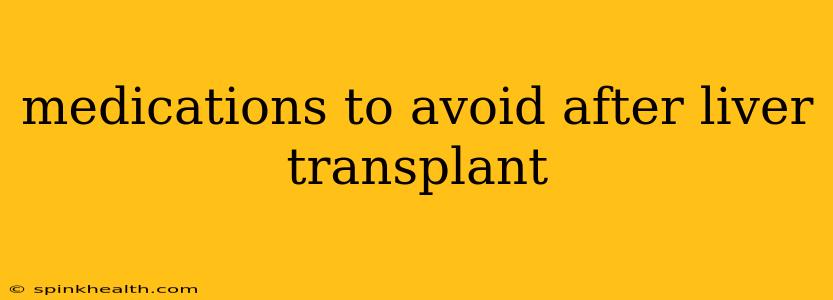Medications to Avoid After a Liver Transplant: A Journey to Recovery
The successful completion of a liver transplant is a monumental achievement, marking a new chapter in a patient's life. However, this new beginning requires careful management, and a crucial aspect of post-transplant care is understanding which medications to avoid. Navigating the complex world of pharmaceuticals post-transplant can be daunting, but this guide will help you understand the critical role medication choices play in your long-term health. Our journey begins with understanding the delicate balance your body needs to maintain after such a significant procedure.
Why are certain medications avoided after a liver transplant?
A liver transplant is a major surgery that leaves your body vulnerable. The transplanted liver needs time to integrate and start functioning optimally. Certain medications can interfere with this process, causing complications such as organ rejection, increased risk of infection, or interactions with other necessary drugs. The goal is to minimize the load on the new liver and support its healthy integration into your system.
What types of medications should generally be avoided?
Many medications are metabolized (broken down) by the liver. After a transplant, your new liver is still recovering and adjusting. Overburdening it with medications it isn’t fully equipped to process can be detrimental. The types of medications to avoid generally fall into these categories:
-
Hepatotoxic drugs: These are medications known to damage the liver. Even before the transplant, these should be avoided whenever possible. Examples include certain over-the-counter pain relievers (like acetaminophen in excessive doses), some antibiotics, and anti-seizure medications. Your transplant team will provide specific guidelines on which medications fall under this category for you.
-
Drugs with significant drug interactions: Many medications interact with immunosuppressants, the drugs crucial for preventing organ rejection. These interactions can either reduce the effectiveness of the immunosuppressants or increase the risk of side effects. This necessitates a careful review of your medication list to identify potential conflicts.
-
Certain herbal supplements and over-the-counter medications: It's vital to inform your transplant team of all medications and supplements you are taking, including herbal remedies. Many of these haven't undergone rigorous testing for interactions with immunosuppressants and could negatively affect your recovery.
What are the consequences of taking inappropriate medications after a liver transplant?
Taking the wrong medication after a liver transplant can have serious consequences. The potential ramifications range from mild side effects to life-threatening complications, including:
-
Organ rejection: This is a major concern. Medications that interfere with immunosuppressants increase the chance of your body rejecting the new liver.
-
Increased risk of infection: Some medications can weaken your immune system, making you more susceptible to infections.
-
Drug toxicity: The inability of the liver to adequately metabolize a drug can lead to a buildup of the drug in the body, resulting in toxicity.
-
Liver damage: Some medications, even those not specifically labeled as hepatotoxic, can still damage the recovering liver.
Are there specific examples of medications to avoid?
The specific medications to avoid will depend on your individual health situation and the drugs you are already taking. This is not an exhaustive list and should not be used as a substitute for your doctor's advice. However, common examples of medication classes that require careful consideration include:
-
Nonsteroidal anti-inflammatory drugs (NSAIDs): These, including ibuprofen and naproxen, can increase the risk of bleeding and kidney problems, issues already heightened after a major surgery.
-
Certain antibiotics: Some antibiotics can be toxic to the liver and interact with immunosuppressants. Your doctor will carefully select appropriate antibiotics for infections.
-
Statins (cholesterol-lowering drugs): While often necessary, some statins can interact with immunosuppressants or have liver-related side effects. Careful monitoring and selection are crucial.
-
Amiodarone (heart medication): This medication is known to have the potential for interactions with transplant medications and liver toxicity.
How can I ensure I am taking the right medications after a liver transplant?
The most important step is to maintain open and honest communication with your transplant team. They will provide a personalized medication plan and regularly monitor your progress.
Remember: This information is for educational purposes only and should not be considered medical advice. Always consult with your transplant team before taking any medication, including over-the-counter drugs or herbal supplements, after a liver transplant. Your health and the success of your transplant depend on this crucial collaboration.

